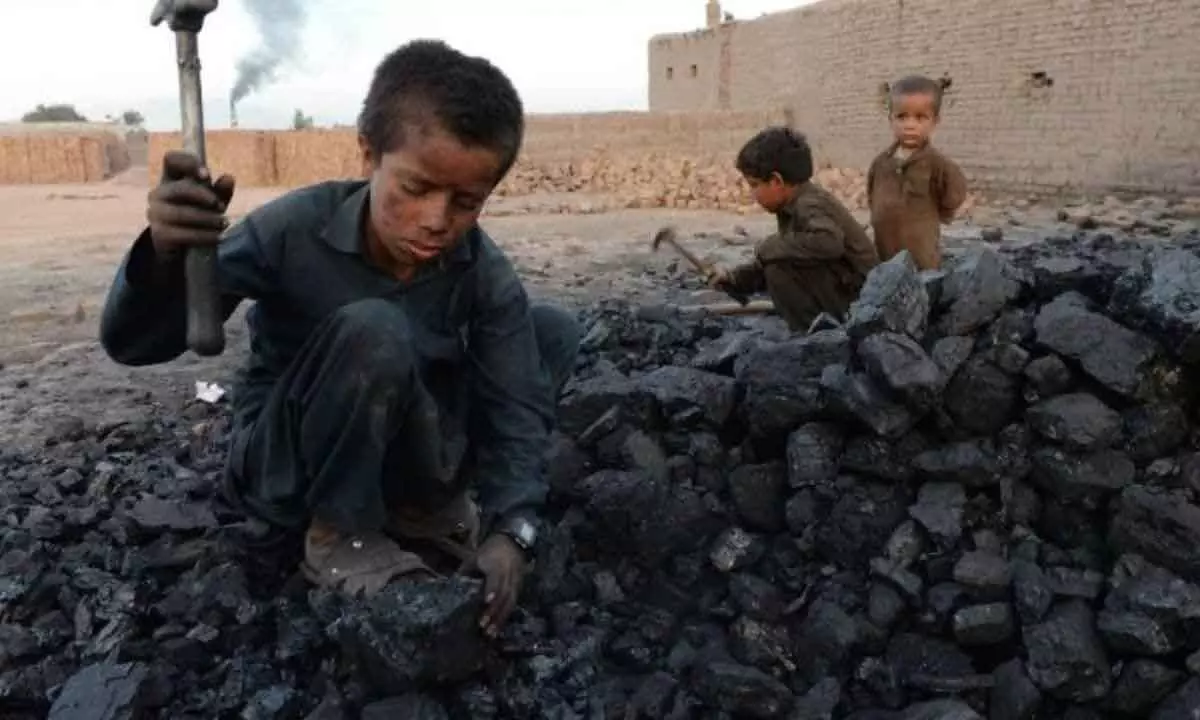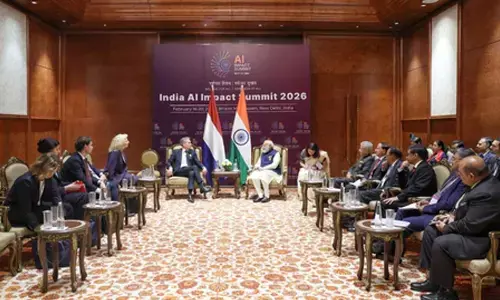Power-hungry politicians precipitating grave crises

Adding to serious fall-out of Covid-19, they are driving humanity to desperation
The number of children living in multidimensional poverty has soared to approximately 1.2 billion due to the Covid-19 pandemic, according to a UNICEF and Save the Children analysis published sometime in 2020. This is a 15 per cent increase in the number of children living in deprivation in low- and middle-income countries, or an additional 150 million children since the pandemic hit earlier.
The figure has only gone up by at least 10 per cent more now. We are not taking the new-poor of Ukraine, the millions who have become refugees now or those from the countries like Sri Lanka and Afghanistan into this count as of now. This also does not count the Syrian refugees who trudged out of the country and survived to face starvation and deprivation.
The multidimensional poverty analysis of the UNICEF report uses data on access to education, healthcare, housing, nutrition, sanitation and water from more than 70 countries. It highlights that around 45 per cent of children were severely deprived of at least one of these critical needs in the countries analysed before the pandemic.
Just as the analyses painted a dire picture, UNICEF too warned of a worsened situation in the world and it happened. "Covid-19 and the lockdown measures imposed to prevent its spread have pushed millions of children deeper into poverty," said Henrietta Fore, UNICEF Executive Director. "Families on the cusp of escaping poverty have been pulled back in, while others are experiencing levels of deprivation they have never seen before. Most concerningly, we are closer to the beginning of this crisis than its end."
The report notes that child poverty is much more than a monetary value. Although measures of monetary poverty such as household income are important, they provide only a partial view of the plight of children living in poverty. To understand the full extent of child poverty, all potential deprivations must be analysed directly. This also points to the need to implement multi-sectoral policies addressing health, education, nutrition, water and sanitation and housing deprivations to end multidimensional poverty.
Social protection, inclusive fiscal policies, investments in social services, and employment and labor market interventions to support families are critical to lifting children out of poverty and preventing further devastation. This includes expanding access to quality health care and providing the tools and technology needed for children to continue their education remotely; and investing in family-friendly policies such as paid leave and child care.
"This pandemic has already caused the biggest global education emergency in history, and the increase in poverty will make it very hard for the most vulnerable children and their families to make up for the loss," said Inger Ashing, CEO of Save the Children. "Children who lose out on education are more likely to be forced into child labour or early marriage and be trapped in a cycle of poverty for years to come. We cannot afford to let a whole generation of children become victims of this pandemic. National governments and the international community must step up to soften the blow."
There are not only more children experiencing poverty than before, the poorest children are getting poorer as well, the report notes. Some children may suffer one or more deprivations and others experience none at all, therefore the average number of deprivations suffered per child can be used to assess how poor children are.
Before the pandemic, the average number of severe deprivations per child was around 0.7. It is now estimated to have increased by 15 per cent to around 0.85. But this is all about the pandemic and its effect.
How about the man-made crisis that has displaced millions around the globe? The humanitarian situation in Afghanistan deteriorated in 2021 with significant consequences for the most vulnerable among the population. Some 3.4 million people are currently displaced by conflict. UNHCR is responding to this emergency. In Iran and Pakistan, which are neighbours of Afghanistan, there are also 2 million registered Afghan refugees. The majority of these refugees fled Afghanistan over the years, including from as early as 1979. A further 5.3 million refugees returned to Afghanistan in phases since 2002, but this trend has been declining in recent times. In August 2021, UNHCR also released a non-return advisory for Afghanistan, calling for a halt on forced returns of Afghan nationals, including asylum seekers who have had their claims rejected.
The total refugee influx from Ukraine as on April 13 this year according to government sources is as follows: Poland (26,94,090), Romania (7,16,797), Russian Federation (4,71,014), Hungary (4,40,387), Republic of Moldova (4,17,650), Slovakia (3,26,244) and Belarus (22,428).
The South Asian region, including Afghanistan, is more vulnerable to risks due to impacts of the Ukraine war and continuing slower growth, says the World Bank.
In a half-yearly regional update released three days ago, the World Bank said Afghanistan faced an unprecedented humanitarian crisis. Pakistan had slumped into a political crisis and Sri Lanka a balance of payments predicament, the report added.
Meanwhile, a British media outlet said Afghanistan's per capita income had decreased by more than a third in the last quarter of 2021. "One of the poorest countries in the world has become much poorer," Tobias Haque, World Bank senior country economist for Afghanistan was quoted as saying.
"The isolation of the Afghan economy following last August's political crisis risks…leading to grave poverty, displacement, fragility, and extremism threats," he told a briefing for the release of the World Bank's first development update on the country since August.
According to the update, about 37% of Afghan families did not possess adequate money to buy food while 33% were able to purchase eatables but nothing more. A statement from the World Bank accompanying the update said: "Under current conditions, the outlook for Afghanistan's economy is dire."
The country's real gross domestic product (GDP) per capita would slide by about 34% by the end of 2022, if the current situation persisted, the bank warned.
These are just a few examples as to how power hungry politicians are driving humanity to desperation. While the wars are imposing direct poverty on people, the sanctions, if any, are resulting in graver injustices pushing entire populations into poverty. They have no business talking about lofty ideals and humanitarian concerns.








